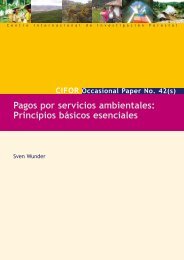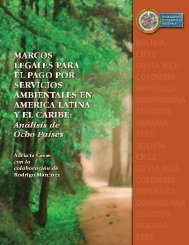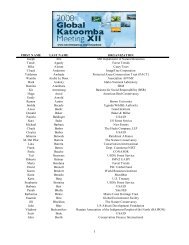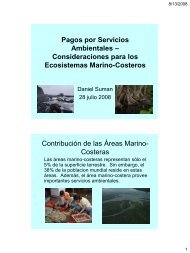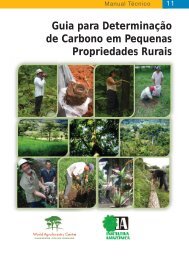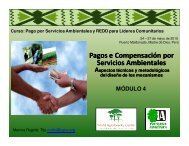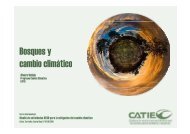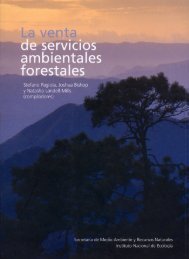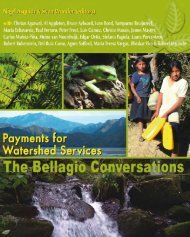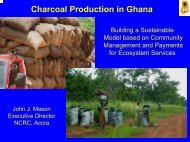Guide on Climate Change and Indigenous Peoples
Guide on Climate Change and Indigenous Peoples
Guide on Climate Change and Indigenous Peoples
- No tags were found...
You also want an ePaper? Increase the reach of your titles
YUMPU automatically turns print PDFs into web optimized ePapers that Google loves.
4. Enhance <strong>and</strong> deepen our underst<strong>and</strong>ing of climate changeto implement more effective <strong>and</strong> appropriate mitigati<strong>on</strong> <strong>and</strong>adaptati<strong>on</strong> measures in our l<strong>and</strong>s <strong>and</strong> territories.5. Create better documentati<strong>on</strong> of good practices in mitigati<strong>on</strong> <strong>and</strong>adaptati<strong>on</strong> <strong>and</strong> share these with other indigenous communities<strong>and</strong> organizati<strong>on</strong>s.6. Participate in climate change workshops/meetings/c<strong>on</strong>ferencesin different levels (local, nati<strong>on</strong>al, regi<strong>on</strong>al <strong>and</strong> global) <strong>and</strong> speakout, if possible.7. Work out strategy papers <strong>on</strong> REDD <strong>and</strong> the issues of technology,finance, adaptati<strong>on</strong> <strong>and</strong> mitigati<strong>on</strong>, <strong>and</strong> capacity building.8. Undertake sustained lobby <strong>and</strong> advocacy work within the UNFCCCprocesses, am<strong>on</strong>g the UN agencies <strong>and</strong> bodies, <strong>and</strong> multilateralbodies to ensure our effective <strong>and</strong> meaningful participati<strong>on</strong> <strong>and</strong>to ensure that our rights, perspectives <strong>and</strong> proposals <strong>on</strong> climatechange are respected, popularized <strong>and</strong> implemented. Activelyparticipate in the formulati<strong>on</strong> of nati<strong>on</strong>al policies <strong>on</strong> climatechange.9. Craft the architecture <strong>and</strong> design of our local <strong>and</strong> nati<strong>on</strong>al selfdetermineddevelopment which will strengthen our low-carb<strong>on</strong>or carb<strong>on</strong>-neutral societies.10. Gather political, technical <strong>and</strong> financial support of theinternati<strong>on</strong>al community <strong>and</strong> nati<strong>on</strong>al support for theoperati<strong>on</strong>alizati<strong>on</strong> of indigenous people’s self-determineddevelopment underpinned by the UNDRIP. For the UN <strong>and</strong> its agencies, governments <strong>and</strong> multilateral <strong>and</strong>bilateral bodies1. The UNDRIP should serve as a key framework in the formulati<strong>on</strong>of plans for development <strong>and</strong> should be c<strong>on</strong>sidered in allprocesses related to climate change at nati<strong>on</strong>al, regi<strong>on</strong>al <strong>and</strong>global levels. The Ecosystem Approach guided by the UNDRIP asa framework can be used by UN agencies <strong>and</strong> governments toc<strong>on</strong>duct researches <strong>on</strong> “<strong>Indigenous</strong> peoples <strong>and</strong> climate change”that can inform the formulati<strong>on</strong> of projects <strong>and</strong> programs forindigenous peoples.2. The safeguard policies of the multilateral banks <strong>and</strong> the existing<strong>and</strong> future policies <strong>on</strong> indigenous peoples of UN bodies <strong>and</strong> othermultilateral bodies, should be implemented in all climate changerelatedprojects <strong>and</strong> programs.146 <str<strong>on</strong>g>Guide</str<strong>on</strong>g> <strong>on</strong> <strong>Climate</strong> <strong>Change</strong> <strong>and</strong> <strong>Indigenous</strong> <strong>Peoples</strong>



